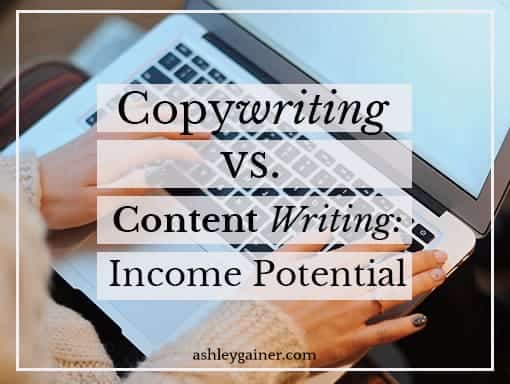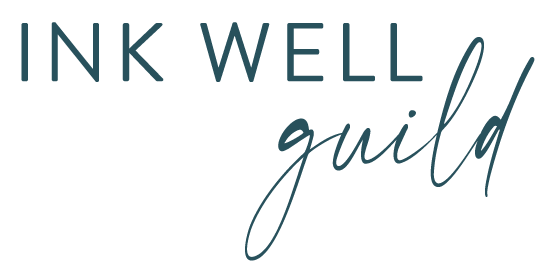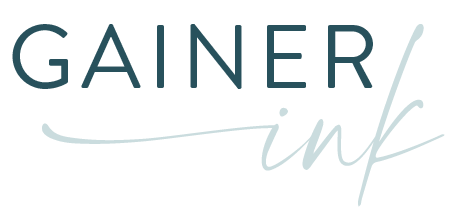For the longest time I avoided copywriting because I was intimidated by it. I stuck with content writing because I knew I was good at it and could do it.
So I want to help demystify things for others with my courses, Facebook group, podcast, and everything I do. Why choose one over the other and is one better than the other? What does this field actually look like?
The difference between copywriting and content writing is something that I cover in depth in my course Copy Confidential. I have three big modules on general writing skills. One module is really, truly general writing skills. The second module is all about content writing and what it is. Then The third module is about copywriting and what that is and why it matters.
The more you can learn about this, the better off you’re going to be career-wise and the sharper your skills will be.
The Main Difference
Copywriting is a big umbrella. Copy = words, so anything you write is copy.
When people say copywriting, sometimes they mean anything being written that involves words. But sometimes they’re talking about a specific thing, direct response copywriting. That’s the one that intimidates a lot of people.
Direct response copywriting means some form of conversion copy.
Usually conversion copy refers to making an offer in exchange for money — sales copy, very broadly speaking. But sometimes it means opting in, downloading, following, etc.
A lot of writers get put off by this. Sales are icky, right? Well… sometimes, but not always. Ethical marketers are out there to make great offers that people are happy to buy. And if you can find them, you can write the conversion copy for them… it’s a win-win-win!
In practice, this might be website copy (which a lot of people call content!). It might be sales pages, email sequences, webinar scripts, course lessons, or social media updates.
So the first thing you need to do when someone is looking for a copywriter is figure out exactly what they are looking for. Because you might see “copywriter” and think, “Oh, I’m not a copywriter,” and turn something down. But really what they need is blog posts… and that falls squarely under content.
So what’s the difference between content writing and copywriting? The main difference is this notion of conversion.
Content writing is more about information. People look to content to give them some sort of answer. Copywriting is more about making a sale (whether you’re selling a paid product or a free ebook).
Pros and Cons of Content Writing vs. Copywriting
Content writing has a low barrier to entry. If you write well, you can be a pretty good content writer. You don’t have to take lots of training first. The basics are pretty simple. Content writing is mostly a matter of knowing how to structure a specific piece and then producing it.
Content can be fun, but it’s not as respected as copywriting. There’s not as much income potential. A few hundred dollars for a blog post is good money in content — and yes, it IS good money, but if you can get really good at conversion copywriting, you’re looking at a few thousand dollars for marginally more work.
Overall, content writers don’t make as much as copywriters. A notable exception is ghostwriting books. Good ghostwriters get paid really well, generally multiple five figures per project.
Copywriting also has the possibility for royalties. Say someone hires me to write a sales page. And say my fee is $7,000, plus 10% royalties. That arrangement means I get 10% of any profits from sales that come from the specific sales page I wrote.
If they stop using that sales page, I don’t get any more royalties, but as long as they’re using it, I get a cut of the profits. It’s a pretty nice setup.
But the barrier to being a copywriter is also higher.
You can’t jump in and call yourself a copywriter. You need to study the format and learn the frameworks, the approaches, and what market research looks like.
(If you get two months to write a sales page, you’re going to spend six weeks of that getting to know the ideal buyer and two weeks doing the writing. Market research is a massive part of great direct response conversion copy.)
How to Train as a Copywriter
If you’re completely strapped for cash, you can bootstrap your education. I did. It just takes longer than plugging into a course.
Google the basics–the Boron Letters is free online, and look up some good copywriting books. Then you get those books from your library if possible. Most libraries usually have at least a few to get you started. (A great one is How to Write Copy that Sells, by Ray Edwards <– p.s. that’s my Amazon affiliate link.)
But in addition to learning up, you’ll need some writing practice, which is why it’s good to start out in content writing to hone your skills, and maybe save enough to take at least one copywriting course. It is a learned skill. For the vast majority of us, it’s not an intuitive thing that you can feel out, even if you’re a good writer.
If you have money to spend, you can leapfrog this DIY process for shortcuts via a course. Belinda Weaver’s copywriting class is about $1,100. It’s pretty good. Marie Forleo and Laura Belgray made Copy Cure, which I think was $1,500 the last launch time.
Ray Edwards, the guy whose book I like so much, has a course that I think is priced at $4,000, but he’s a master and you’d learn so much if you enrolled. My course Copy Confidential right now is priced at $797.
You can also find copywriting courses for less. You’ve got options!
Almost everything I did before I started getting paid well as a direct response copywriter was mostly self-directed–books and studying. Then I started doing well and taking more courses and doing some in-depth, high-end study.
I just went to a copywriter conference and learned cool stuff and met inspiring people. I’m getting more serious the more in depth I go with specific direct response copywriting. It’s a process — one that builds and grows.
Natural Progression from Content Writing to Copywriting
Whether you choose one or the other as your preference, there does seem to be a natural progression from content writing to copywriting for many freelance writers.
For example, maybe a client says, “I really like your blog posts. Can you do some of my emails?”
Writing emails often falls squarely under copywriting. So then you’d be shifting from content writing (blog posts) into more of a conversion copy arena.
This natural path is actually one I’ve laid out for students in my courses.
You start out with Clips Camp, which is $27. It teaches you how to get started as a content writer with blog posts, and builds your portfolio. It focuses on early-career content writing. If you want to start out with copywriting, you can also use it, but you’ll have to do a little bit of your own additional clips.
Next, I help you with the process of developing your career through my podcasts, my emails, and my Facebook group. A Facebook group is cool because then you have a community of people who are not just curious about freelance writing, but are actually in it and doing it, which is valuable. That stuff is all free, by the way.
Then my next course, Client Bound, teaches you how to find clients.
My latest course, Copy Confidential, is a really robust course that goes over content and copy. It teaches direct response basics and how to apply them to content writing. It also teaches you how to transition into copywriting, and how to do all the different types of writing work. (Plus, if you enroll in Copy Confidential, you’ll get Client-Bound for free.)
See the progression?
Where are you on your writing path, and where do you want to end up?







